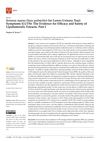What Do We Know About Phytotherapy of Benign Prostatic Hyperplasia?
February 2015
in “
Life Sciences
”
phytotherapy benign prostatic hyperplasia BPH Serenoa repens saw palmetto Pygeum africanum Urtica dioica stinging nettle pumpkin seeds Epilobium spp. Hypoxis roopery herbal medicines plant-based treatments extraction procedures mechanisms of action drug interactions medicinal plants standardized herbal products

TLDR Some plant-based treatments can help with benign prostatic hyperplasia symptoms, but more research is needed to confirm their safety and effectiveness.
The document from 2015 reviews the use of phytotherapy for benign prostatic hyperplasia (BPH), detailing various plant-based treatments and their clinical and preclinical studies. It discusses the efficacy and safety of several herbal medicines, such as Serenoa repens (saw palmetto), Pygeum africanum, Urtica dioica (stinging nettle), and others, in treating BPH symptoms. While some treatments like Serenoa repens have shown to be well tolerated and effective, comparable to conventional medications with fewer side effects, others like pumpkin seeds, Epilobium spp., and Hypoxis roopery require further research to confirm their efficacy and safety. The document also notes the variability in extraction procedures and the complex mechanisms of action of these plant-based medicinals, which make comparisons between products difficult. Safety concerns are raised regarding the quality of herbal products and potential drug interactions. The review emphasizes the need for healthcare professionals to be informed about the risks and benefits of medicinal plants in BPH management and calls for greater communication between patients and doctors for personalized treatment. It also highlights that many herbal products are not standardized and that their safety and efficacy data are often based on short-term treatment in a small number of patients. The study was supported by the "Enrico and Enrica Sovena Foundation" in Rome, Italy.





